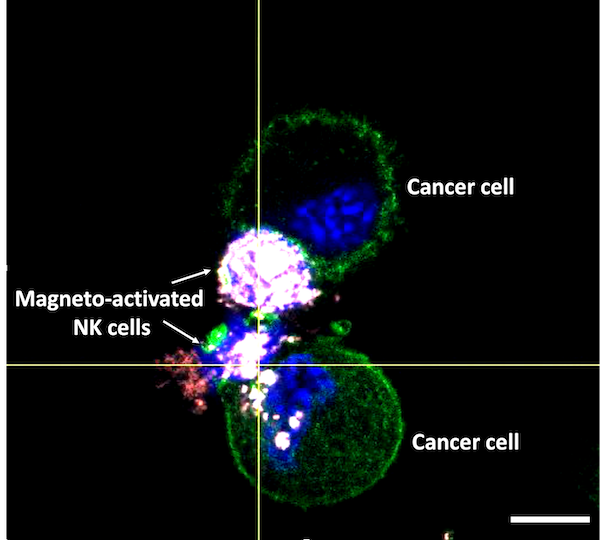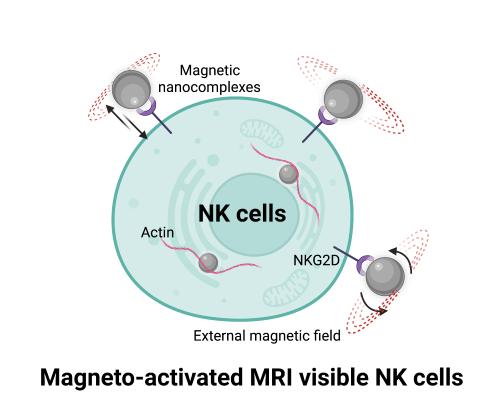Preclinical study uses magnetic field to activate and track natural killer cells
Cancer immunotherapy—a type of treatment that enlists our own immune cells to attack tumors—has revolutionized the way that many types of cancer are treated. One type of immunotherapy under investigation uses natural killer cells, a type of immune cell that can seek and destroy harmful cells. However, current strategies to stimulate these cells to harness their tumor-killing abilities are costly and time-intensive. To overcome this, NIBIB-funded researchers are developing a method to activate natural killer cells using an external magnetic field, which not only enhances their cytotoxicity, but allows them to be tracked using magnetic resonance imaging (MRI) to verify that they’ve reached their target.

“Adoptive cellular therapies—where immune cells are removed from the body, modified to better attack cancer cells, and infused back into the patient—represent a breakthrough in cancer treatments,” said Tatjana Atanasijevic, Ph.D., manager of the NIBIB program in Molecular Probes and Imaging Agents. "This early work outlines a new and creative way to stimulate natural killer cells by modifying them with magnetic nanocomplexes, facilitating their activation upon exposure to a magnetic field and enabling an image-guided treatment approach."
How do natural killer cells work? These white blood cells are part of the innate immune response, which means that they can kill harmful cells (like cancer cells or infected cells) without having prior exposure to them. They do this by looking for specific receptors on neighboring cells that identify them as “self,” meaning that they belong in the body. If the cell doesn’t have those receptors, the natural killer cell believes it to be “foreign” and releases a cocktail of cytotoxic molecules, which penetrates the offending cell and causes it to die.
While natural killer cells are efficient and lethal, cancer cells can find ways to evade them, especially in established tumors. One strategy to “beef up” natural killer cells is to incubate them with specific interleukins, or signaling molecules that stimulate the natural killer cells and enhance their lethality (or cytotoxicity). However, this process is both time-consuming and expensive, and this approach has resulted in limited clinical success, especially in solid tumors.
In addition to signaling molecules, natural killer cells can be stimulated through physical interactions with their environment, like traveling through the bloodstream, squeezing through tight spaces, or attaching to other cells. These physical interactions can exert force on the natural killer cells and activate them, a concept known as mechanical force-mediated immune signaling. “Instead of priming natural killer cells with interleukins, we are investigating an alternative way to stimulate these cells by subjecting them to mechanical forces,” explained Dong-Hyun Kim, Ph.D., an associate professor at Northwestern University.

But their strategy doesn’t rely on typical environmental interactions to exert these mechanical forces. Rather, Kim and colleagues are attaching magnetic nanocomplexes to the natural killer cells, and then subjecting them to a magnetic field.
“The magnetic field can remotely control the movement of the nanocomplexes, which in turn applies a mechanical force to the natural killer cells that they are attached to,” Kim said. These perturbations caused by the magnetic field “tug” on parts of the cell which signals them to generate cytotoxic molecules, he explained. “By applying the appropriate magnetic field conditions, we are able to elicit the natural killer cells to generate and secrete molecules that enhance their cytotoxicity and tumor-killing potential.”
In their study, reported in ACS Nano, the team evaluated their magneto-activated natural killer cells both in a culture dish with human liver cancer cells and in a rat model of liver cancer. They found that the magneto-activated natural killer cells had significantly enhanced cytotoxicity compared with unmodified natural killer cells in their cell culture experiments. Further, in the animal experiments, treatment with the magneto-activated natural killer cells resulted in a reduced tumor growth rate compared with treatment using modified natural killer cells that were not stimulated using an external magnetic field.
Another advantage of the magnetized natural killer cells is their ability to be monitored in the body using MRI. “MRI visibility of our tagged natural killer cells allows us to confirm their successful delivery to the tumor region,” Kim said. Indeed, using MRI, the researchers were able to guide the delivery of their magnetized natural killer cells and verify that they had reached the liver tumors in their animal studies.
Kim stressed the preclinical nature of this feasibility study and noted that more rigorous investigations are needed before this method could be translated to humans.
This study was supported by a grant from NIBIB (EB026207) and a grant from the National Cancer Institute (NCI; CA218659).
Study reference: Taehoon Sim, Bongseo Choi, Soon Woo Kwon, Kwang-Soo Kim, Hyunjun Choi, Alexander Ross, and Dong-Hyun Kim. Magneto-Activation and Magnetic Resonance Imaging of Natural Killer Cells Labeled with Magnetic Nanocomplexes for the Treatment of Solid Tumors. ACS Nano 2021 15 (8), 12780-12793. DOI: 10.1021/acsnano.1c01889
This Science Highlight describes a basic research finding. Basic research increases our understanding of human behavior and biology, which is foundational to advancing new and better ways to prevent, diagnose, and treat disease. Science is an unpredictable and incremental process—each research advance builds on past discoveries, often in unexpected ways. Most clinical advances would not be possible without the knowledge of fundamental basic research.
